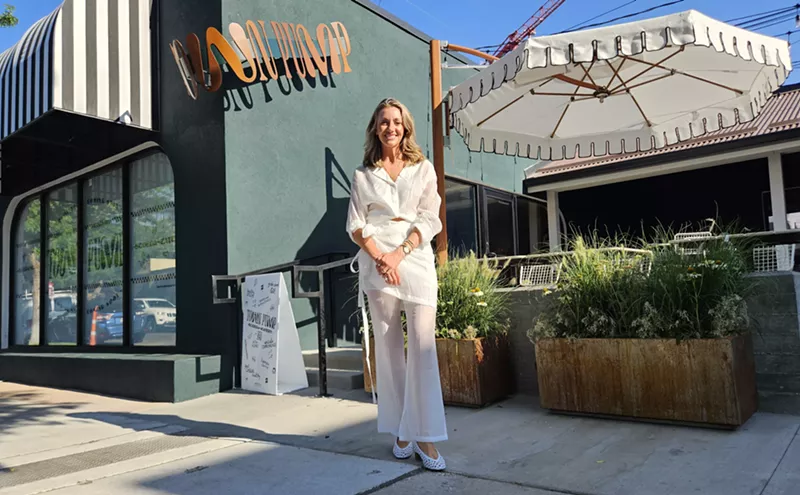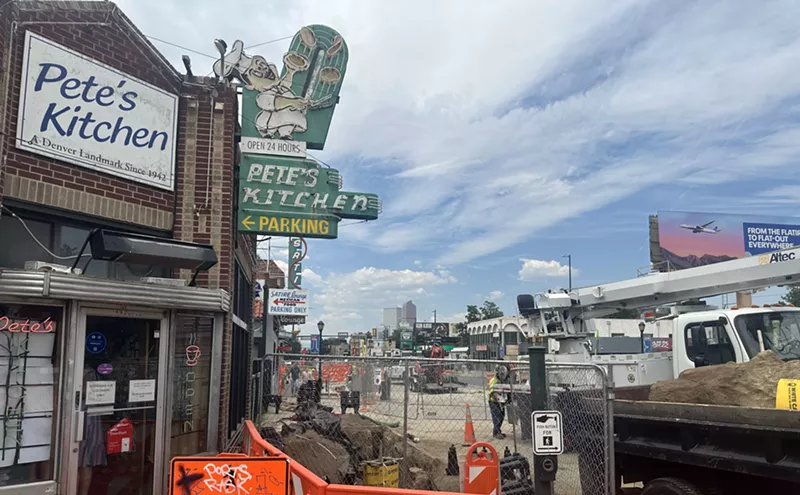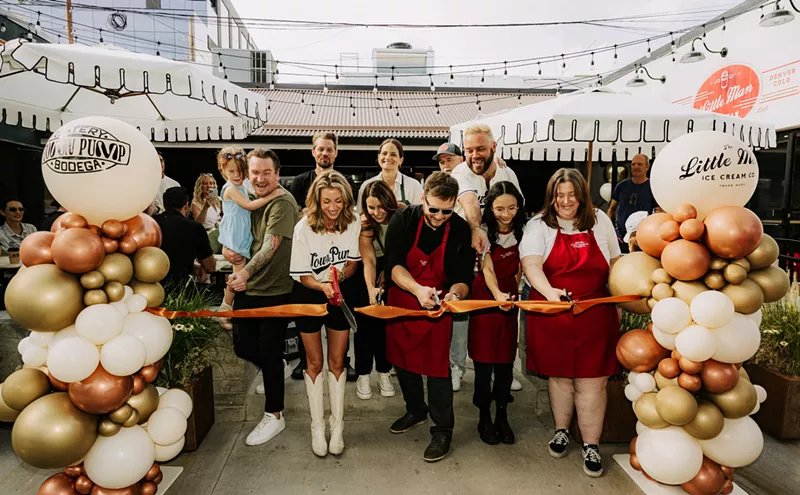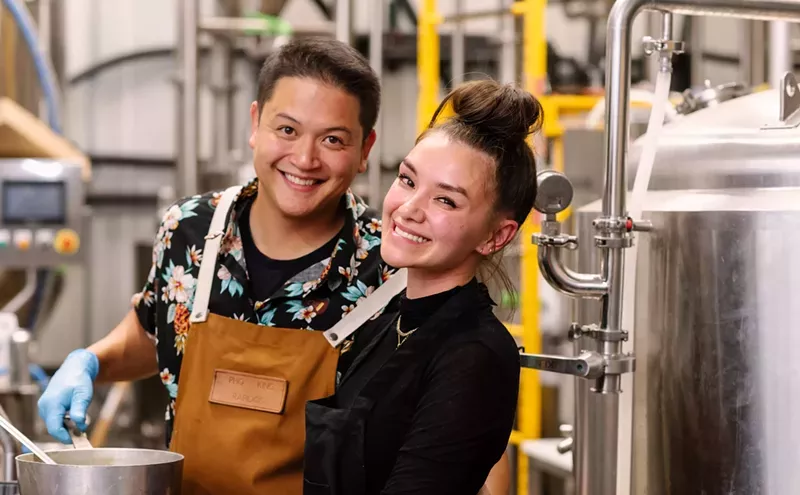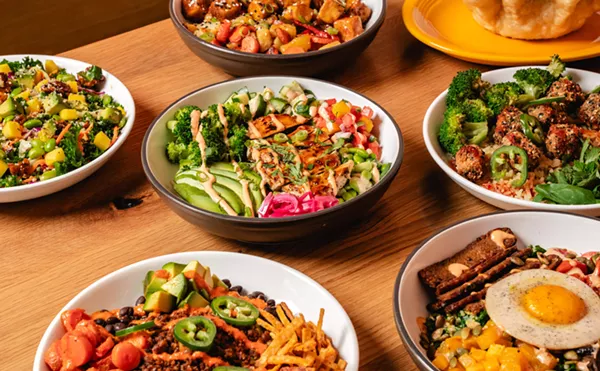It's 1983, I'm ten years old — and it's steak night at the Sheehan household.
Steak nights didn't happen very often at my house. But every now and again, Mom would go to the freezer and pull out a frost-rimed, plastic-wrapped Styrofoam tray of thin, choice-grade steaks bought on sale at the neighborhood Wegmans and then saved against need. She would scrape some of the ice off with a thumbnail, check to make sure that the beef inside was still vaguely meat-colored (never pink, of course, or bloody, beautiful red, but rather gradations of purply-gray) and then leave the package to thaw on the kitchen counter. Mom was a great believer in technology, in the near-magical powers of the upright freezer in the kitchen. That miraculous white box — jammed full of mysterious packages, ancient Tupperware and wrapped balls of what might've been cookie dough, might've been meatballs — could keep food safe and edible for years. Decades. It was like a time machine for comestibles. Reach in blindly, pull out a package, and suddenly you were back in the middle of the Carter administration or thawing leftover beef stew first eaten on the night the Steelers beat the Cowboys in Super Bowl XIII, January 21, 1979.
The steaks would sit on a plate on the counter, slowly losing their pre-Cambrian frost. My brother and I would come home from school; Dad would come home from work. He'd see the steaks, change out of his work clothes and go out into the back yard where his grill sat. His elderly, gas-fired charcoal grill. His elderly, gas-fired charcoal grill that, depending on how the household finances were shaking out, how the weather had been, might not have been used for weeks or months. He would bend down, start fussing with gas lines and igniters, tapping at the tank with the metal end of a pen or a pair of pliers. Because Dad was a mechanic and a repairman, we got almost everything — every appliance, every piece of home electronics — second- or third-hand. We got the things he hadn't been able to repair during the regular course of his job so had brought home to tinker with in his spare time. Sometimes he got them to work grudgingly, sometimes he didn't. Like a dedicated preacher, though, he considered these castaway domestic devices as part of his flock and never gave up on the possible salvage of their mechanical souls. The grill was one of his more recalcitrant projects. It never worked well, sometimes didn't work at all, and so there was always the chance that, on steak night, Dad would go outside, start poking around the guts of that intractable grill and accidentally blow himself up.
My brother and I were always waiting for it, knowing full well that such an explosion wouldn't kill the man — nothing could do that, not to a guy we'd once seen cut one of his fingers nearly off while working in the garage, then tape it back together with black electrical tape and go right back to work — but just drive him back into the house, smoke-black and probably bleeding and laughing, looking for the tape, maybe a staple gun, with which to reassemble any of his own missing parts. But the explosion never came, and Dad would eventually gimmick the grill into action, take the steaks and stand outside in the lowering dark cooking, smoking, gently hitting a can of Genny Cream Ale, doing what a man does on a good night when he has done good work and is proud to be able to offer steaks to his little suburban tribe.
The smell of cheap steaks burning on a grill, of char smoke on the spring air mixing with the smell of hyacinth and burley-and-bright. That will always remind me of my dad, of my mom watching him through the little window in the kitchen looking out over the back yard, of good days when I knew in some deep and mostly inaccessible part of my childhood self that things were, for the moment, okay. Steak nights were like quiet celebrations of small victories — solid knowledge that there was enough money to pay the bills, that the grownups had done whatever it was that grownups do to make things all right for a few hours or a few days.
If I were Proust, that smell would be my madeleine — the trigger for a crashing flood of recall, of me in the warm comfort of boyhood. And walking past the back door of the Columbine Steak House, I get a whiff of it. Just a hint — a trick of the breeze sucking a breath of blood and smoke and fire out through the open door where a busboy stands smoking a cigarette in the afternoon sun — but it is enough to stop me in my tracks and nearly drive me to my knees from the weight of memory. The scratched black paint of Dad's grill. The pop and hiss of him opening his can of Genny Cream. The taste of bloody, low-rent beef on my tongue.
The Columbine claims to have been "nationally known for fine steaks since 1961" — since my dad was the age that I'm remembering being, standing in its back parking lot almost fifty years later. It is a survivor, the kind of place they don't make anymore, that no one has made in decades: a steak diner, a pure-strain joint, with a faded and smooth-worn dining room in front and a dim lounge in the back with a bar, a juke, a few booths and bottles of old-man liquor in the racks like a museum of classic alcoholism: Canadian Club and Ballantine's and John Powers Irish. It is menu service in the lounge, short-order up front, with an abbreviated stretch of bright aluminum counter the color of a new Airstream and a cafeteria setup. You look at the menu hung above the two cooks working the grill and just tell them what you want: T-bone, tenderloin, New York or porterhouse, plate of shrimp (shades of Repo Man...) or burgers or fries. Pay at the register five feet away — cash only, no checks, no plastic. Then wait.
When I walk in the front door, the dining room is running near-capacity, and two cooks are working the grill like it's said something nasty about their mother. They have close on twenty steaks already mapped onto the grate, putting some to the flame, others holding warm and par-cooked.
"Getcha?" asks the cook.
"T-bone," says me.
"How you want it?"
"Mid-rare."
"'kay."
And done. Fourteen bucks and change to the register for my steak dinner and a fountain Coke, three dollars into the tip jar. At this point, the smell is washing over me like rain — smoke rising up, the sizzle and flare of fresh meat being pulled bare-handed out of the cooler and slapped down onto any empty acreage on the grill. I get my drink, grab the second-to-last table, and before I've even settled into my seat, one of the cooks is calling me back: "T-bone, medium!"
For my money, I get a straight iceberg salad (dressing ladled out of inserts set between the cafeteria rail and the short-order pass, no sneeze-guards here) with a little shredded carrot and red cabbage; a thick slice of Texas toast off the grill and soaking with butter; a baked potato in a foil jacket, already split and mounted with more butter — a ball of it, as big as a small scoop of ice cream — and my steak: big enough to overhang the lip of my plate, marked with an inexpert quadrillage but lovely to me regardless. My T-bone is tender except for the twists of fat and gristle near the bone. It tastes of flame and char and blood and meat and history. The potato has soaked down butter like a sponge, and I eat it with bites of Texas toast just because too much butter is never quite enough. Later, I will return for an even cheaper steak, a ten-dollar New York that I'll cut with a rickety, wood-handled dollar-store knife, tear into pieces and eat with my fingers, the meat pressed into torn hunks of Texas toast. And then I'll come back again, collapsing into one of the deep booths in the lounge for cold, happy-hour beers and a porterhouse: top of the menu at fifteen bucks.
No one comes to the Columbine for the service, the artful plating or the charming company. And no one steps into this raggedy, patched dining room expecting a fat, USDA Prime steak-of-the-year slab of beef. You either come to the Columbine because you love the good, cheap stuff — because you remember when most restaurants were like this one, before everyone started putting wasabi or truffles or lemongrass in everything — or because you understand that the difference between paying fifty dollars for a steak and paying fifteen dollars for a steak is mostly about paying for the crowd, the tablecloths, the fine plates and the sommelier's salary. But I like the Columbine for both reasons. I love iceberg salads with blue-cheese dressing out of a plastic jug more than I love almost any other kind of salad. I love baked potatoes that are used mostly as a cover for people too embarrassed to eat butter with a spoon. And I have always loved cheap steaks because, to me, cheap steaks are the only kind that actually taste like steak. Yes, I enjoy a Prime porterhouse or a fat rib-eye, perfectly rare and on the bone. But because of the way I grew up, those heroic cuts of incredibly expensive cow flesh taste more like luxury and fat-ass braggadoccio than they do steak. I am always faintly embarrassed when I walk into a serious steakhouse, knowing good and goddamn well that I would not ever be in that restaurant were it not for this job.
But at the Columbine? Christ, I just feel like I'm home.



